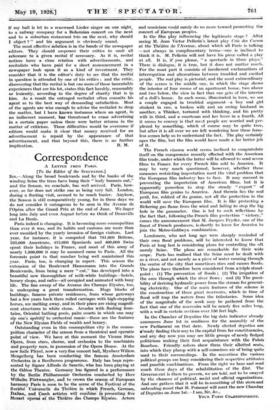THE DIGNITY OF THE CONCERT HALL.
EVERY year about this time the music critic finds cause to complain that his time is being wasted by performers who have not yet passed beyond the student stage. Recitals are given by so many unknown people that it is quite impossible for him to decide which of them he must neglect. So eager is he to appraise the arrival of a new talent that he hastens from hall to hall in feverish anticipation. But almost invariably he is disappointed. He is called upon to listen to pianists, violinists, singers (especially singers) and string quartets who not only have attained little in the way of technical proficiency but reveal no-sign of potential achieve- ment. At length he is wearied by mediocrity and is forced to confess that recital giving is on the whole a sorry business'
What is the remedy ? Certainly it does not lie with the agents. We can hardly expect them to hold a voice trial for every singer who seeks their co-operation. They are only too glad to enrol anybody who is rich and simple enough to want to give a recital. Nor can we look to the hall manager for redress. If you tell him that there is such a thing as the dignity of the concert hall, he has a ready answer. " That dignity," he will inform you, " consists chiefly in funds, and if my hall is let to a renowned Lieder singer on one night, to a railway company for a Bofieinian concert on the next and to a suburban restaurant trio on the next, why should I object ? " and his argument is obviously sound.
The most effective solution is in the hands of the newspaper editors. They should emperwer their critics to omit all referende to a given recital if necessary. As it is, recital notices have a close relation with advertisements, and recitalists who have paid for a short announcement in a newspaper look upon it as a kind of investment. They consider that it is the editor's duty to see that the recital in question is attended by one of his critics ; and the critic, discovering that the recital is but one more of those lamentable experiences that are his lot, states this fact harshly, reasonably or leniently, according to the degree of charity that is in him. As a result the outraged recitalist often consults his agent as to the best way of demanding satisfaction. Most of the agents are wise enough to advise the recitalist to drop the matter, but I have known instances where an agent, in an indiscreet moment, has threatened to cease advertising in a certain paper unless there were better returns in the matter of criticism. These difficulties would be overcome if editors would make it clear that money received for an advertisement is repaid by the appearance of that advertisement, and that beyond this, there is no further



































 Previous page
Previous page